International trade is a crucial component of a country’s economy and is vital in determining its gross domestic product (GDP). The exchange of goods and services between countries enables them to access a broader market and diversify their income sources. The impact of exports on the economy is far-reaching, from boosting employment rates to increasing citizens’ living standards. W. Easterly, who in early works (2001, 2005, based on data from the 80s and 90s) concluded that “good macro and trade policies are not sufficient for sustained high growth,” later released an update of his research, where new data show that there is a correlation and a significant one at that [1,2]. Professor Douglas Irwin [3] from the US National Bureau of Economic Research, one of the most influential economists in international trade, released an extensive review of scientific research on the impact of foreign trade reforms on economic growth and productivity. Recent research on data from developing countries indicates that trade liberalization gives countries 1-1.5% additional growth each year – it is 10-20% per decade.
The Ukrainian economy faced many challenges after the start of the full-scale invasion, which led to a reduction in real GDP, skyrocketing inflation, the severing of economic ties, and the growth of the budget deficit to unprecedented levels [4]. Fiscal policy has been geared toward prioritizing spending on defense, social benefits, humanitarian needs, and, where possible, some fixing of critical infrastructure.
Moreover, to wartime problems, new factors were added – the general slowdown in the growth of the world economy, including our leading trading partner – the European Union. The economies of some countries have already recognized the transition to recession. Restrictive measures regarding Ukrainian exports of agricultural goods also had an impact.
Trade geography. The new composition of the leading countries – buyers of Ukrainian goods, in which Russia and Belarus lost prominent places as early as 2022 – fifth and 14th in 2021, respectively – continues to form against geopolitical rebalancing and sanctions policy against countries that sponsor terrorism. The three countries to which the most goods were exported from Ukraine in the eight months of 2023: Poland: $3.4 billion (-25.2% decrease from the volumes in the eight months of 2022), Romania: $2.6 billion (+20.6%) ), and China: $1.8 billion (+8.4%).
The countries from which the most goods were imported to Ukraine are: China — $3.9 billion, Poland — $2.7 billion, and Turkey — $2 billion.
The unprecedented increase in the share of the European Union in the geographical structure of Ukraine’s commodity exports, starting from 2022, in addition to problems with the use of port infrastructure, is directly related to the EU’s support measures for Ukraine. These support measures not only led to an increase in the specific weight of EU countries in Ukrainian exports but also allowed Ukrainian exporters to slightly increase the volume of exports of goods to EU countries. Among European countries, Poland has the most significant volumes of export and import (Fig. 1). In terms of export volumes, Poland has been in first place since 2017, and from 2022 – also in terms of import volumes (before that, the country was still in the top three). Thus, in 2022, Ukraine sold goods worth 6.81 billion dollars to Poland, purchased – 5.55 billion dollars. In second place among countries for export is Romania, with 2.19 billion dollars, and Germany, with 1.08 billion dollars, in third place. Goods worth 193.1 million dollars were exported to Great Britain, the second largest aid donor to Ukraine. In addition to Poland, Ukraine imported the most goods from Germany this year – $2.75 billion, and Bulgaria – $1.36 billion. The volume of imports from Italy, France, Hungary, and Slovakia amounted to more than a billion.
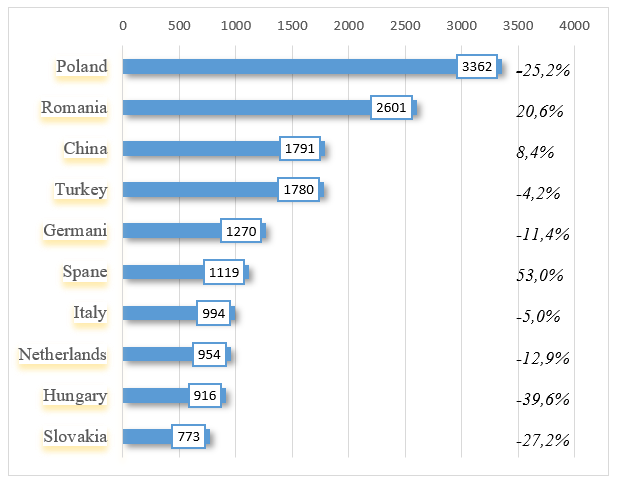
Fig. 1. Where does Ukraine export to? Top 10 ($ million and change from 2022) Data for 8 months 2023 [5,6]
Commodity structure of exports. The most exported categories of goods from Ukraine for eight months of 2023 are food, $14.6 billion; metals and products from them, $2.7 billion; and machines, equipment, and transport, $2.1 billion[7].
The export of products of the agro-industrial complex is five times greater than the export of goods of the metallurgical sector. However, these were quite equal channels of foreign exchange earnings to Ukraine for decades.
In 2022, the European Union temporarily removed import duties and quotas for Ukrainian agricultural products (Fig. 2). The measure was introduced to support Ukraine’s economy amid a full-scale war and Russia’s blockade of seaports. As a result of the simplification of conditions, in 2022, Ukraine received the main part of the income from the export of agricultural products thanks to sales to EU countries. At the same time, the surplus of Ukrainian products led to the collapse of prices in regional markets.
EU agricultural prices for both output and non-investment factors declined in the third quarter of 2023, confirming a shift away from significant price increases during 2021 and 2022. These latest data indicate further calm in global agricultural markets after a period of turmoil. The average price of agricultural goods in the third quarter of 2023 decreased by 9% compared to the same quarter of 2022 [8]. There was also an acceleration in the rate of decline in non-investment prices of agricultural inputs, from -5 % in the second quarter of 2023 to 11% in the third quarter.
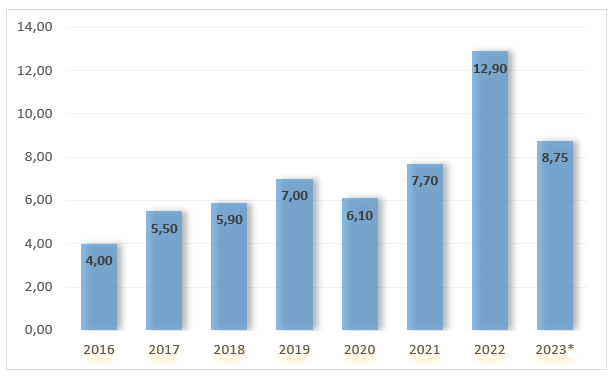
Fig. 2. The cost of export of agricultural products from Ukraine to the EU before and after introducing the preferential regime (bln. dol.) [9,10].
* data for January-October 2023
The largest exporter of Ukrainian grain is the Kernel company, which accounts for 8% (Fig. 3). It is the world’s largest producer and exporter of sunflower oil, whose products are delivered to more than 70 countries. The French grain trader Louis Dreyfus accounts for 7% of the total export of Ukrainian grain, which makes it the largest exporter of this product among foreign companies. The Ukrainian agricultural company “Nibulon” also has a 5% share in the total export of grain from Ukraine (the founder, Oleksiy Vadatursky, died in July 2022 as a result of shelling of Mykolaiv by Russian troops).

Fig. 3 The largest exporters of Ukrainian grain [11]
The most negative trends in export volumes are among product groups such as fertilizers (-87%), inorganic chemical products (-78%), clothing (-68%), petroleum products (-52%), plastics and polymers (-45%), etc.
The main reasons for the decline are the direct consequences of the war: domestic demand for military clothing and fuel does not contribute to the growth of exports. The main centers of the chemical industry, metallurgy, salt extraction, and plastics production turned out to be concentrated in Ukraine’s temporarily occupied or frontline regions. Exporting companies were either physically destroyed during hostilities, stopped working, or significantly reduced production. Some managed to relocate their enterprises, which took time, which is why production was reduced.
Commodity structure of import. The increase in imports by 19.2% became possible due to the significant financial support provided to Ukraine by its Western partners in the form of loans and grants, because Ukraine’s trade deficit reached record levels this year. In particular, according to the results of three quarters, it reached 19.4 billion dollars, having increased by 3.6 times compared to the same period last year, when it amounted to 5.4 billion dollars. For every dollar received from the export of goods, Ukraine imports goods for more than 1.71 dollars [12].
Mineral fuel (petroleum products, natural and liquefied gas), which was imported for 7.9 billion dollars, which is 17.1% of the total volume of imports, remains the leader (as in all recent years). The second position is in imports by means of land transport, which were imported for three-quarters of 5 billion dollars. (10.7%). The third is for electric machines, equipment, and parts (4.3 billion dollars and 9.3%, respectively).
The leading supplier of imports by a large margin remains China, from which products worth 7.4 billion dollars were imported. Chinese imports increased by more than 1.6 billion dollars or by 28.5%. The import of goods from Poland also increased – by 1.1 billion dollars up to 4.9 billion dollars. (30%).
Export-шmport operations in numbers. According to the results in 2023, export volumes in Ukraine increased and amounted to almost 100 million tons of goods, which is 112 thousand tons more than in 2022 (Fig. 4). However, according to the State Statistic Service of Ukraine, the indicator fell by 18.7% or $35.8 billion [13]. Despite the general decline in the export of Ukrainian goods, positive trends are observed in the furniture market. Last year, compared to 2022, volumes increased by 11% and cash receipts by 7%. Ukraine also exported 1.7 times more sugar than the previous year.
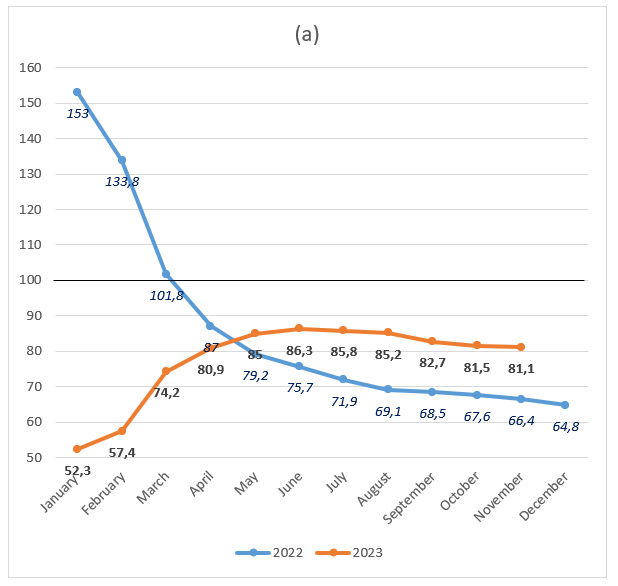
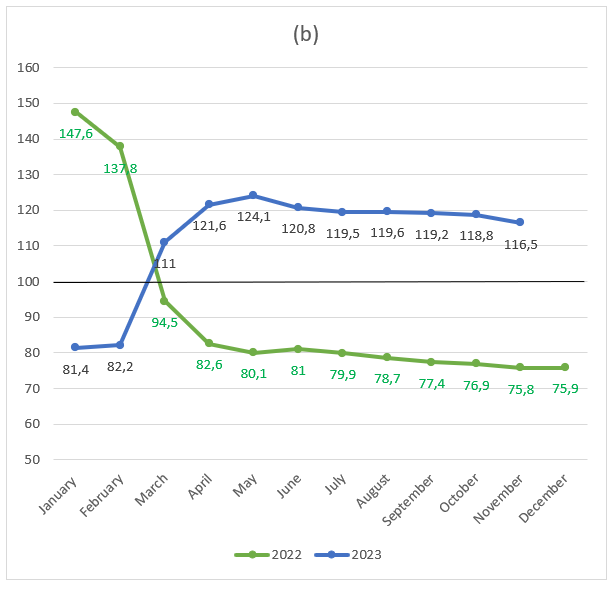
Fig. 4 Foreign trade of Ukraine for 2022-2023
(a) The rate of growth (decrease) in the export of goods (in % compared to the corresponding period of the previous year, cumulatively)
(b) The rate of growth (decrease) in the import of goods (in % compared to the corresponding period of the previous year, cumulatively
As mentioned, the Ukrainian economy lost revenue in 2023 for most export items. For example, corn, the most significant export product by volume, with a physical growth of 5% in money, brought 16.8% less than a year earlier. Last year, 26.2 million tons of this grain crop were exported from Ukraine.
First Deputy Prime Minister of Ukraine – Minister of Economy of Ukraine Yulia Svyridenko [14] stressed that the revenues from exports last year reached one of the lowest indicators in the last decade. This is an expected and objective result, which resulted from problems in logistics that were solved slowly. Ukraine has launched an alternative corridor in the Black Sea, we are developing river transportation on the Danube, and negotiations are ongoing with the Polish side regarding unblocking the border.
With the Ukrainian Government’s and international partners’ joint efforts, sea transport exports are also growing. Compared to November, this indicator increased by a third in December and amounted to 7 million 340 thousand tons of cargo. In general in 2023, Ukraine exported almost 1 million tons more by sea than last year. In addition to grain, other goods, mainly metal, are exported this way. After the launch of the alternative sea corridor, the export of products of this group increased. Thus, in December, compared to November, the export of semi-finished products increased by 40% and flat-rolled products by 45.3%. Ukraine increased its exports by container transportation by +86% by rail transport and +36% by road. It is now the most efficient mode of transport for value-added products.
In conclusion, with the signing of the Association Agreement in 2014, Ukraine and the EU undertook, among other things, to promote cooperation in the economy and international trade. Accordingly, a significant part of the restrictions on importing Ukrainian industrial goods was lifted at the beginning of 2016, when the Agreement on establishing the Trade Area between Ukraine and the EU entered into force. However, most of the restrictions on the import of Ukrainian agricultural products remained relevant. After the start of Russia’s large-scale invasion of Ukraine, the EU took an unprecedented step: in June 2022, all restrictions on the import of Ukrainian goods were lifted. The volume of Ukrainian imports from the EU increased significantly even though due to the blockade of the Black Sea by the Russian fleet, the lion’s share of Ukrainian exports is transported through the western land border, and the Danube ports have limited capacity. Currently, the state of the existing border infrastructure does not correspond to the forced loads.
Overall, the total value of trade between Ukraine and the EU increased by 10% between 2021 and 2022, and 11% between 2022 and 2023. Radical liberalization served as a lifeline for the Ukrainian economy in a state of war. At the same time, she pointed out the numerous problems that must be overcome on the way to a full and mutually beneficial integration of Ukraine into the EU internal market.
Photo: Pexels.com
Bibliography
[1] William Easterly, Ariell Reshef, and Julia Schwenkenberg (2019) The Power Of Exports, source: https://elibrary.worldbank.org/doi/abs/10.1596/1813-9450-5081
[2] Easterly, W. (2019). In search of reforms for growth: New stylized facts on policy and growth outcomes (No. w26318). National Bureau of Economic Research, source: https://www.nber.org/system/files/working_papers/w26318/w26318.pdf
[3] Does trade reform promote economic growth? A review of recent evidence. Douglas A. Irwin, NBER, Cambridge, 2019, source: – https://www.nber.org/system/files/working_papers/w25927/w25927.pdf
[4] Ukraine: Request for Purchase Under the Rapid Financing Instrument-Press Release; Staff Report; and Statement by the Executive Director for Ukraine (October 19, 2022) International Monetary Fund, source: https://www.imf.org/en/Publications/CR/Issues/2022/10/19/Ukraine-Request-for-Purchase-Under-the-Rapid-Financing-Instrument-Press-Release-Staff-524913?cid=em-COM-123-45549
[5] Сильне плече аграріїв, Forbs, source: https://forbes.ua/money/silne-pleche-agrariiv-za-visim-misyatsiv-2023-go-agrosektor-prinis-ukraini-u-pyat-raziv-bilshe-viruchki-nizh-metalurgiya-zagalom-mi-eksportuvali-tovariv-na-245-mlrd-yaki-kraini-kupuyut-ukrainske-dosli-11102023-16579
[6] Економічна статистика (Зовнішньоекономічна діяльність) України, Українська Служба Статистики, source: https://ukrstat.gov.ua/operativ/menu/menu_u/zed.htm
[7] Товарообіг України, Дія, source: https://export.gov.ua/news/5133-tovaroobig_ukraini_za_11_misiatsiv_2023_roku
[8] Agricultural prices fell in the third quarter of 2023, Eurostat, source: https://ec.europa.eu/eurostat/web/products-eurostat-news/w/ddn-20231220-2
[9] Як змінювалася вартість експорту української аграрної продукції до Євросоюзу, Слово і Діло, source: https://www.slovoidilo.ua/2023/04/06/infografika/ekonomika/yak-zminyuvalasya-vartist-eksportu-ukrayinskoyi-ahrarnoyi-produkcziyi-yevrosoyuzu
[10] Україна стала третім за величиною постачальником агропродукції в ЄС, ЛігаЗакон, source: https://biz.ligazakon.net/news/224589_ukrana-stala-tretm-za-velichinoyu-postachalnikom-agroprodukts-v-s
[11] Рейтинг найбільших експортерів зерна з України 2022/23, source: http://shareuapotential.com/BE/ukrainian-zerno-krupneishie-exportery-2023.html
[12] Огляд зовнішньої торгівлі, Федерація работодавців України, source: https://fru.ua/ua/media-center/news/fru/oglyad-zovnishnoji-torgivli-ukrajinskimi-tovarami-za-3-kvartali-2023-roku
[13] Економічна статистика / Зовнішньоекономічна діяльність, source: https://www.ukrstat.gov.ua/operativ/menu/menu_u/zed.htm
[14] Відділ зв’язків з громадськістю та засобами масової інформації, Міністерство економіки України, source: https://www.me.gov.ua/News/Detail?lang=uk-UA&id=0d632ce6-fc09-4b3c-a310-bf2d042517d0&title=NavitPopriBlokuvanniaKordonuUListopadiVvpVirisNa4-



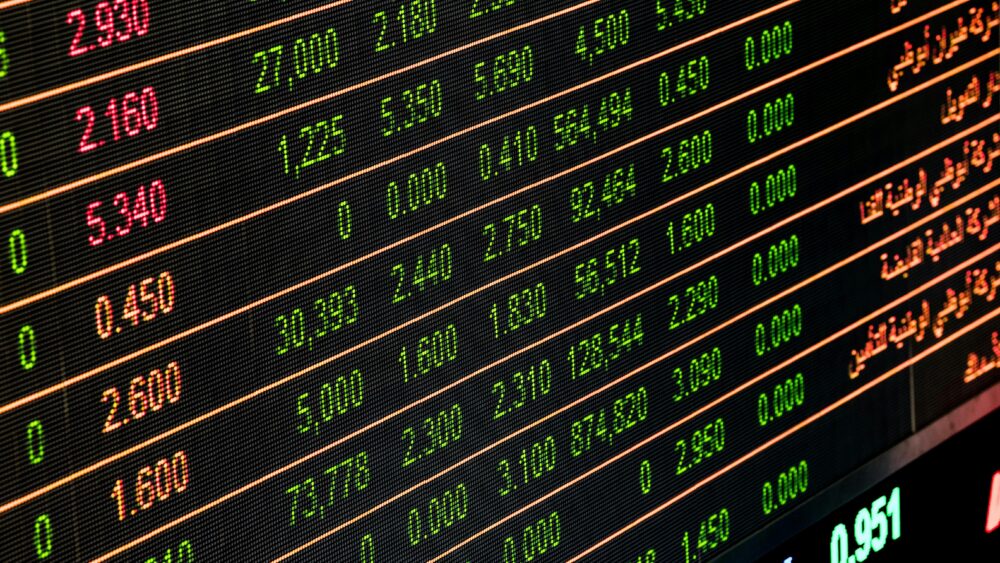





























Comments are closed.